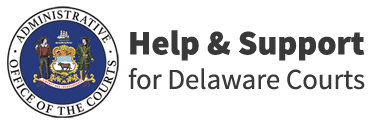What To Expect at Trial in the Justice of the Peace Court
Courtroom Guidelines
Please Observe the Following Guidelines while in the Courtroom:
- Cellular telephones and other personal electronic devices are allowed in court facilities with restrictions which can be found in the Portable Electronic Devices policy.
- Courtroom Technology Policy: The Court does have some limited ability to allow electronic files to be displayed on a projector in certain courtrooms. Parties wishing to display electronic files in the courtroom must notify the Court in writing in advance to make sure the equipment is available at the time of trial.
The courtroom equipment is exclusively for the display of evidence to the Court through files stored on CDs, DVDs and USB devices. The courtroom equipment will accept the following file formats: .AVI, .MP4, .MOV, .WMV, .MPEG1, .MPEG2, .MPEG4, .DIVX, .MPG, .MPEG. The courtroom equipment should not be used for any other purpose. Any media used on the courtroom equipment must be virus and Trojan free. Also any media containing inappropriate or illegal information is prohibited on this device. The courtroom equipment is not networked and will not allow access to any external sites. - Do NOT wear a hat unless you must wear one for religious or medical reasons.
- Do NOT eat, drink, or chew gum in the courtroom.
- ALWAYS stand when addressing the Judge and ALWAYS call the Judge "Your Honor."
- Act respectfully, reasonably, courteously, and politely to everyone in the courthouse.
- Keep calm. Control your emotions and stay focused.
- Do NOT talk unless it is your turn to speak. When it is your turn to speak, speak up so everyone in the courtroom can hear you.
- Respond to questions verbally. Say "yes" or "no" instead of nodding your head in response.
- Do NOT have side discussions or argue with the other side at any time. Speak directly to the Judge, unless you are answering questions or asking a witness questions.
- Do NOT argue with the Judge.
- If you do not understand a question, ask for clarification or ask to have the question repeated.
- ALWAYS tell the truth.
Trial Procedure Guidelines
A Trial in the Justice of the Peace Court Will Proceed as Follows:
Please wait in the lobby until your case is called to the courtroom. When you are called to the courtroom, please observe the guidelines listed above.
1. Court is Called to Order
- The Judge will call the court to order and verify the parties in attendance.
- The Judge will summarize the case as filed to be sure both parties are clear as to the matter before the court and to confirm that the defendant still wishes to contest the claim.
2. Opening Statements
- The PLAINTIFF (party who filed the suit) will make an brief Opening Statement.
- The DEFENDANT (party against whom the suit was filed) will make a brief Opening Statement.
An opening statement is when a party tells the court what that party intends to prove through testimony, evidence, and witnesses.
3. Plaintiff Presents Case
- The PLAINTIFF will then be asked to call their first witness. (Parties may call themselves as witnesses). All witnesses must be sworn-in by the court prior to giving their testimony.
- After the witness has finished his or her direct testimony, the DEFENDANT may Cross-Examine the witness.
A cross-examination means asking the witness questions regarding anything about which the witness testified only. - When the PLAINTIFF has presented all of the plaintiff's witnesses and evidence, the plaintiff rests his or her case.
4. Defendant Presents Case
- The DEFENDANT then presents his or her case, calling any witnesses and presenting any evidence the defendant may have.
- The PLAINTIFF may cross-examine the defendant's witnesses after their direct testimony is complete.
- The Judge may ask questions or any witness. These questions should be answered clearly and directly.
- If a COUNTER-CLAIM has been filed, the DEFENDANT may call witnesses and submit evidence regarding the COUNTER-CLAIM matters.
- Plaintiff may Cross-Examine any witnesses called by the defendant.
5. Closing Statements
- Then the DEFENDANT may make a Closing Statement to the judge.
A closing statement is when a party summarizes his or her case by telling the court what he/she thinks they proved and why the court should find in his or her favor. - The PLAINTIFF, if necessary, is given an opportunity to rebut anything the defendant brings up in his or her summation.
- The Judge will make a decision.
- The Judge may give an immediate decision.
- The Judge may call a brief recess to consider the matter in chambers.
- The Judge may Reserve judgment, in which case, both parties will receive the judge's decision along which the rationale for the decision within 30 days.
- A Non-Suit Judgment may be entered against a Plaintiff who fails to appear at trial.
- A Default Judgment may be entered against a Defendant who fails to appear at trial.
6. Court is Adjourned
- All parties will receive a copy of the Judgment by mail.

